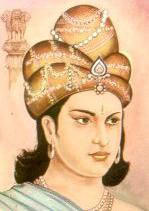ASOKA

Asoka was the third emperor of the Mauryan Dynasty and ruled India from 268 to 239 BCE. Shocked by the destruction he had caused by his war with Kàliïga, Asoka converted to Buddhism, and spent the remainder of his reign trying to govern his vast realm by spiritual principles. He renounced an aggressive foreign policy, promoted religious harmony, established hospitals, reformed the judicial system and sent Buddhist missionaries throughout India and abroad. It was primarily because of Asoka's patronage, that Buddhism became an India-wide religion as quickly as it did. To make known his various reforms, Asoka issued a series of edicts, and had them inscribed on rocks and huge stone pillars, which were set up all over India. Two of these edicts issued in 256 BCE and written in Greek were found in Kandahar in Afganistan in 1963. Asoka's edicts are the earliest decipherable written records from ancient India. See Kings.
The Edicts of King Asoka, S. Dhammika,1993.